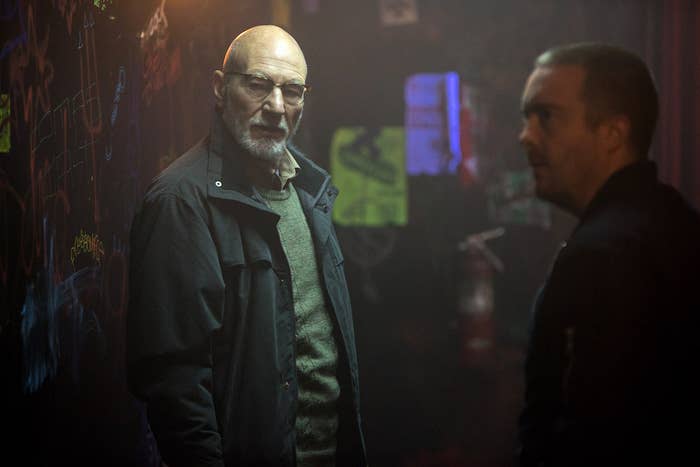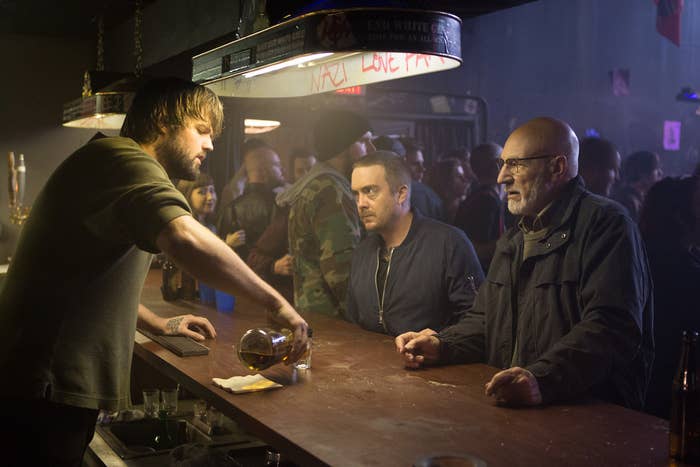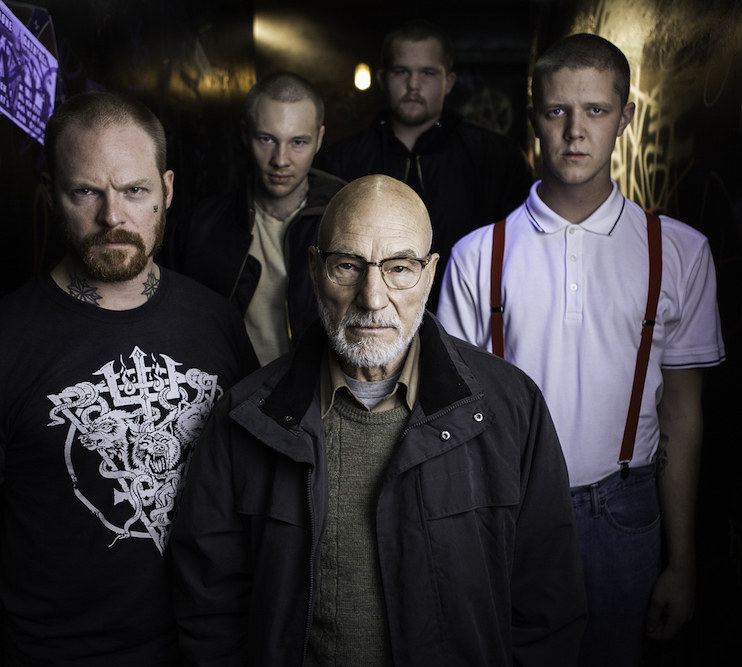
Patrick Stewart is best known for his portrayal of the incorruptible Capt. Jean-Luc Picard on Star Trek: The Next Generation, and the equally upstanding Charles Xavier in the X-Men movies — men who rarely, if ever, resort to physical violence. But in the new thriller Green Room, the actor plays Darcy Banker, the leader of a white supremacist skinhead gang.
The character operates with quiet, lethal cunning, as he organizes his gang to take out the four members of an indie punk rock band who have barricaded inside Darcy’s club after one of them accidentally witnesses a brutal act of violence there. Stewart harnesses his ability to seem like the most rational man in the room to chilling effect, especially as the band tries to reason with Darcy, only to realize with escalating terror that pleading with this man for their lives is a waste of breath.
Darcy's ability to project calm and menace in the same moment is part of what drew Stewart to the film, by writer-director Jeremy Saulnier (Blue Ruin). It tapped into one of the 75-year-old actor's deepest fears — and evoked a harrowing encounter from his past he's rarely discussed before.
"I think most of my life, certainly when I was a child, what I used to be afraid of was being in a situation where there would be other individuals who I would identify as dangerous with whom I couldn't reason," Stewart told BuzzFeed News in a recent interview in Los Angeles. "I couldn't say, 'Look, let's just have a drink and talk this over. I'm sure we can resolve our differences.'"
And Stewart hasn't quite overcome this fear, either. "Given the world we're living in presently, I often find myself imagining some situation whereby I might be in the presence of an extremist who has no respect for me or for my life," he said. "Would I have the guts to challenge them? I'd like to think that I'd give it a shot, and try to talk about how they feel and what they want to achieve, if they want to achieve anything. Because of what we read in the newspapers weekly, the chances of our encountering people like that are growing every day. And I think at the moment, that is something that frightens me more than anything else."

When asked if he had ever dealt with an extremist like Darcy Banker, Stewart paused for a long time, and then replied, "No, I have not."
But then he took a deep breath, and proceeded to tell a story about a time in his twenties when he got to know his town's local ne'er-do-well.
"His name was Alan," Steward said. "He was a gifted writer, but he was very troubled. I knew that he had done time in prison for GBH — grievous bodily harm. And I knew that he had, especially when he had been drinking, a tendency to violence. But he was a very interesting writer — and when sober, an interesting man."
Stewart had spent enough time getting to know Alan that he thought it was fine to go drinking with him and some other friends one night at a pub. He realized just how wrong he was after he excused himself to go to the bathroom and Alan followed him inside.
"He closed the door, stood with his back to the door, and pulled out a knife."
"He closed the door, stood with his back to the door, and pulled out a knife — a really nasty knife," Stewart recalled with a grimace. "I didn't recognize him. His face was changed. I knew I must have said something when we were in the group that had upset him. It might just have been a joke that misfired, or a comment the he didn't like. And, I suspect, he might have felt threatened by it. And when threatened, he only had one default action, which was to attack. … I felt certain that something really bad was going to happen, and that he meant me harm."
Stewart suddenly had to confront the possibility that his deepest childhood fear had just become a reality. So he did what has served him so well for so much of his career: He reasoned with the man. "I talked, and talked, and talked, and talked to him,” Stewart said. “I talked about our friendship, and how much I respected his work and his writing. And how much knowing him had meant to me." He took in a deep breath. "And finally, he put the knife away."
Afterward, Stewart said the two continued to be friendly. "But I was much more cautious when in his company," he said. "I made sure I was never alone with him again, and that there were always others around. He would have bitterly regretted having harmed me. I know he would. But it would not have stopped him."

It was such an indelible encounter that Stewart found himself recalling it as he developed his approach to playing Darcy Banker in Green Room. "I've only talked about it ever a couple of times, but it was very much in my thoughts," he said. It wasn't just the palpable sense of danger Stewart felt, either — it was also the false sense of safety he had taken for granted around Alan, and the wariness he always felt around him afterward.
"Because it's essential to the storytelling of the movie that the audience for a time believe this guy's going to make it all right," he said. "The others are crazy, but he's arrived now, and nothing bad is going to happen. … He wants to reassure [the band members]. He wants them to be what he needs them to be, which, of course, is dead."
It’s a sensibility Stewart is able to convey with biting clarity in Green Room because it’s one he remembers all too well from his experience more than 50 years ago. “What Alan communicated to me in that pub toilet,” he said, “was what I thought [would] be interesting to explore in Darcy Banker."
